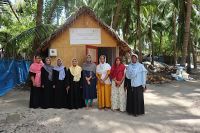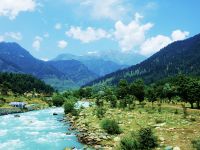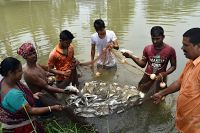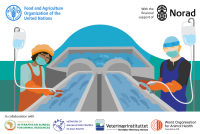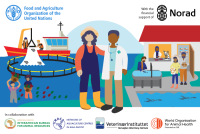Promoting and encouraging community participation in marine ornamental aquaculture presents an alternative approach to enhancing the economic status of marginalised individuals, particularly women, in the Lakshadweep islands. Additionally, it aids in curbing the wild capture of marine ornamental organisms, thereby relieving pressure on natural resources. The article examines the strategy of community-based marine ornamental aquaculture and its significance in bolstering the economy of islanders, particularly women, in the Lakshadweep Sea. It seeks to investigate effective approaches to promote the sustainability of the coral reef ecosystem in the region. High-value marine ornamental organisms, such as fishes and shrimps, are cultivated in community aquaculture units using simplified technology. These organisms are supplied to aquarists and hobbyists, thus supplementing the income of local women islanders.
Jammu and Kashmir, often referred to as “heaven on Earth,” owes its distinct soil and vegetation to its unique climate. With abundant green forests and high-altitude terrain, it boasts valuable natural resources such as Himalayan glaciers and rivers. Rainbow trout is a promising cultivable fish species in cold water and holds significant potential for expansion. As a high-value commodity with relatively low production volume, trout offers opportunities for both domestic consumption and foreign export. However, the development and scaling of trout farming in the region has not yet been realised on a large scale. This article documents the history of trout fisheries in the region, describes the present status of trout farming infrastructure, and provides strategies to expand the industry.
The Central Institute of Freshwater Aquaculture uses funds from the Scheduled Caste Sub Plan project to provide support such as fish seed, feed, lime, and manure to Scheduled Caste farmers. The goal is to enable them to utilise untapped water resources for fish production. This support in aquaculture inputs has resulted in increased fish production, heightened income, the creation of employment opportunities, the development of skilled labourers, and made a significant contribution to the national income. Marginal fish farmers have consistently generated revenue through these efforts. They have also directly provided poor communities with essential nutrients through fish consumption, combating hunger. This article describes the methodology and outcomes of the project Scientists-Farmers Interface and Aquaculture Input Support to SC Farmers of Sonarpur C.D. Block.
This event, held jointly via Zoom or in person at FAO Headquarters in Rome, will bring together leading experts to delve into the topic of fish vaccination and new developments regarding shrimp vaccination as a vital biosecurity strategy. Current knowledge will be reviewed, examining obstacles, and uncovering opportunities for vaccine development. Bridging theory with actionable practice, the seminar aims to foster informed decision-making, discussing the potential of vaccination and addressing associated challenges. Building upon the success of the Tilapia Health webinar held in December 2021 and Tilapia health: quo vadis, this conference will be a continuation of impactful discussions, promising a dynamic and enriching experience for all participants.
Fish-Vet+ Dialogue II: One Health and Biosecurity will be held jointly via Zoom and in person at FAO Headquarters in Rome. The dialogue provides a neutral ground for continued discussions on the pressing challenges facing aquatic food systems, particularly vulnerability to diseases in the absence of robust biosecurity measures.
The hybrid event aims to foster stronger networking among key stakeholders across the aquaculture value and supply chain, including governance authorities, the private sector and academia.
